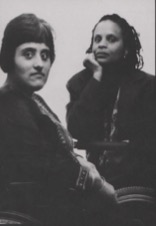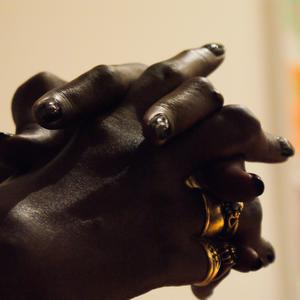 Dear Sisters,
Dear Sisters,
I would like to assign this letter as an appreciation to our British Black Disabled Women and British Disabled Women of Colour activist and campaigners because I don’t think you get thanked enough.
British Black Disabled Women and British Disabled Women of Colour have a right for their lives to be remembered. Their lives are no less important than other activist. In addition, I want to remember the lives of our sisters that died because they resisted and spoke out against the suffering, abuse, injustice and inequality. I also want to remember our sisters that died through the failure of institutions that are set up to protect individuals from abuse and neglect. As in the case of Beverley Lewis who was found dead at the age of 23. The inquiry report found that the London Borough of Newham Local Authority failed to support Beverley’s mother who had mental support health needs which led to Beverley’s premature death.
Thank you for being pioneers and phenomenal women in disrupting the societal and political paradigm to bring about changes in the law and increasing opportunities for everyone.
You fought a tough fight which was not just about gender equality it was about the multitude of oppression experienced by Black Disabled Women and Disabled Women of Colour. You showed us the importance of acknowledgment, self-love and also not to overlook our different intersections so that they become invisible and also not to let others determine our possibilities. You told the world that we are not ‘less of a woman’ and that our existence is not disposable and unvalued. This is exactly the point our sister Sojourner Truth from across the Atlantic asked at a conference
“Ain’t I a Woman?”
Thank you for empowering me to grow in my political consciousness, to understand the cause and effects of power and privilege action. You warned us about the effects of the ‘glass ceiling’ the barrier that keeps Black People and People of Colour from progressing but the situation is exasperated for Black Disabled Women and Disabled Women of Colour. And you also warned us against being manipulated, that often our invitation may be to fulfil a diversity exercise.
I now know the reason as to why it annoys me when I hear
“we cannot find Black Disabled People…”
This is a lie! Because, according to Black History Studies, Black People have been living in Britian since 2nd century AD. So, this is the reason why I say we should not forget that India, some African countries and some Caribbean Islands were colonised and ruled by Britain up until the 1960’s. Today some Caribbean islands still have not achieved their independence from British ruling. For example, Monserrate and people living in these islands are British citizens even though they live in other parts of the world. Therefore, it’s simply ridiculous that the presence of British Black Disabled Women and British Disabled Women of Colour remain underrepresented or ignored from our history.
Your experience has proven even today when we speak out about our situation it is interpreted as revenge and a demand for retribution. This is a false notion because literature shows that your struggle and fight was never selfish or egoistic but for equality for everyone.
You created a great platform for us but we now need to transform the discourse so that we are not written out of history, considered as invisible and underrepresented in all areas of life. You also remind us that women’s existence should not be relegated to only one day of the year. It is for this reason why I have identified the following British Black Disabled Women and British Disabled Women of Colour to showcase the contributions they made to equality but also making your dreams our possibilities and our reality.
 Picture of Barbara Stewart hands (refer below for further information). Photo taken from My Shape Poems.
Picture of Barbara Stewart hands (refer below for further information). Photo taken from My Shape Poems.
Past activist and campaigners:
- Nasa Begum was a qualified social worker, produced a number of publications and work on the needs of Disabled refugees and asylum seekers. She co-wrote the book Reflections with Milliedrette Hill (Begum, N, Hill, M and Stevens, A, 1994).
- Milliedrette Hill was a student barrister, freelance writer and an advocate on race and disability. She co-founded Black Disabled People Association and actively spoke out about the experience of Black Disabled People. She co-wrote the book Reflections with Nasa Begum and Andy Stevens (Begum, N, Hill, M and Stevens, A, 1994).
- Menghi Mulchandani was the Chief Executive of Action Disability Kensington and Chelsea for 13 years. She was the first Disabled Person and Woman of Colour to be appointed to lead the organisation. So far she remains the first Disabled Women of Colour to have served as a Chair of the National Centre for Independent Living.
- Mary Price was born in Barbados and was brought to London in the 1820s by her owners, the Woods. She was the first women to present anti-slavery petition to Parliament for Enslaved African People to gain freedom from slavery.
- Barbara Stewart was a poet and community activist. She was also known for her work on disability hate crime.
Present activist and campaigners:
- Julie Jaye Charles the founder and head of the Equalities National Council organisation advocating on Black Disabled People’s issues. She has contributed to a number of publications on the issues effecting Black Disabled People in Britain.
- Eleanor Lisney is a cofounder of Sisters of Frida, British Council Disability Advisory Panel and the web team of the International Network of Disabled Women. She was the driving force for making the Million Women Rise accessible. 2010 was the first year that a platform lift was provided to assist Disabled Women to access the stage on which Eleanor and I spoke on. She has worked tirelessly with the organisers of the London Women of the World event to ensure Disabled Women have a presence on the panels.
- Caroline Nelson has been the Chief Executive of Choice in Hackney for over 10 years. The organisation provides advocacy services for local Disabled People. She remains one of the few British Black Disabled Women to head a Disabled People’s Organisation in London.
- Saadia Neilson in 1990s she moved from Morocco to live in England. She is an international trainer on disability issues and human rights. Saadia took part in a number of protests including the ITV Telethon. She worked closely with Milliedrette Hill and also campaigns on other intersectional issues effecting Disabled People.
- Sarifa Patel a community activist and campaigner. She runs the London Borough of Newham Disabled Reps Forum and campaigns against segregated education.
- Angela Smith actively campaigns on independent living issues and is a committee member of Race Equality Foundation. She also contributed her story to Reflections book (Begum, N, Hill, M and Stevens, A, 1994).
- Deborah Williams is a performer, writer, producer and director. She is known for her contribution in the implementation of the Disability Discrimination Act in the cultural sector.
I believe that there is so much we can continue to learn from the past and cross-generational activism. I encourage you to share their stories and think about how we can deepen and extend their work but also engage young Black Disabled Women and Disabled Women of Colour in activism because they are the future.
Respect and One Love
Thank you!
Reference for Reflections Book
Begum, N, Hill, M and Stevens, A (1994). Reflections. The views of Black Disabled People on their Lives and Community Care. Central Council for Education and Training in Social Work. London

Welldone Michelle brillant piece of writing really capturing our history and the hard work of us all warrior women fighting the adds just because we are women who are women oc colour and our others several different identities.Carry on the good work